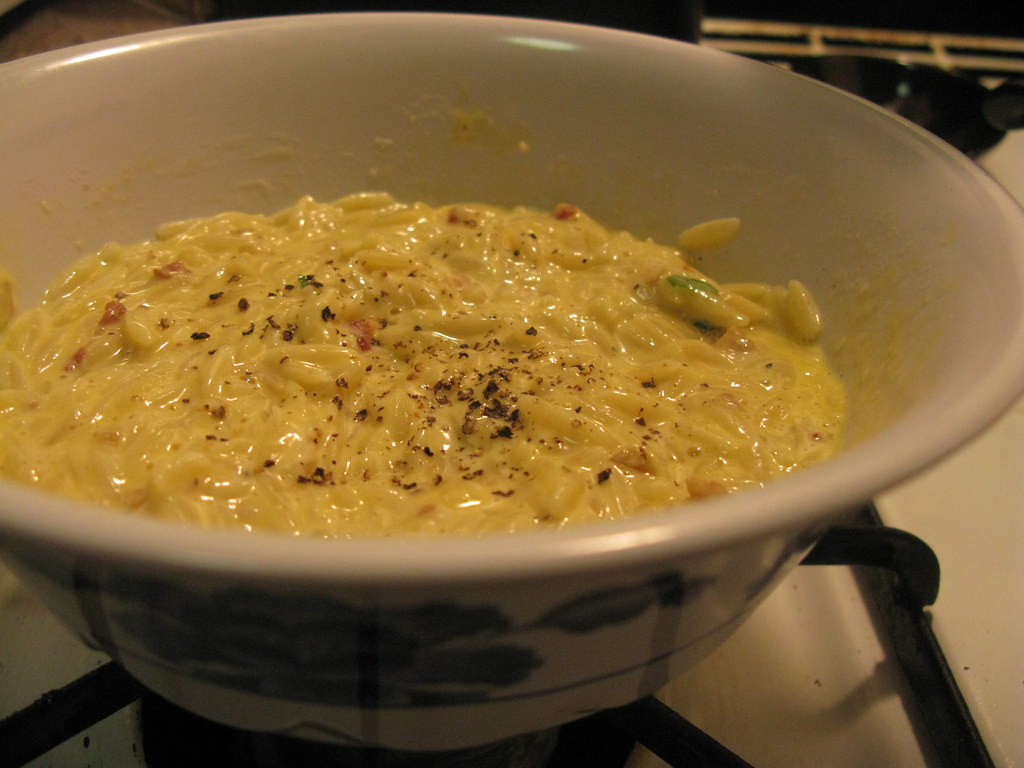I'd be right there with you, had I not recently discovered that there is a small but vocal community of carbonara purists out there, trolling the web in order to find and attack the authors of so-called "bastardized" carbonara recipes. Edward Schneider of The New York Times became one such victim when he blogged about his attempt to recreate at home the carbonara dish he had been served by Joël Robuchon at his restaurant in Monte Carlo.
This carbonara uses small bite-sized pasta such as acini di pepe, although we settled for orzo. The pasta is served with crispy strips of bacon, cracked black pepper and a rich creamy sauce of caramelized shallots, parmesan cheese and heavy cream. Schneider suggests slow cooking an egg for 45 minutes at 145 degrees and cracking one into each serving, but when we tried to fudge this, we wound up with hardboiled eggs. So we had egg salad for the next day's lunch and just put a raw egg into each bowl of hot pasta and then stirred it all together and ate our soupy carbonara with a spoon.

orzo carbonara
As amazing as that dish sounds, folks immediately went to town in the comments, belittling Schneider for calling such a dish a carbonara, and going so far as to demand a correction from the Times and less sloppy and careless global reporting. It was all pretty ridiculous. (Bonus points if you can pick out Boyfriend's inflammatory comment aimed at putting uppity carbonara purists in their rightful place.)
Robuchon is a masterful French chef. He was actually voted the chef of the CENTURY, so he's got nothing to prove, and I'm sure he's well aware of the "true" recipe for carbonara. That being said, the chef of the century is not going to serve the traditional carbonara as perfected by Roman peasants. He's going to take that tried and true recipe and play around with it, tweaking the ingredients and methods in order to create something new and high end that both pays homage to and is evocative of the original dish. Great chefs don't replicate, they create.
Now, I am sure that "real" carbonara is fucking fantastic. I'd love to make it some day. Perhaps I'll see the error of my ways and never again add cream or garlic or parsley or bacon. However, I'm pretty sure I'm always going to think the carbonara I grew up with is delicious— because it is, bastardization or not! And so was Schneider/Robuchon's!
Basically, the way I feel is that if someone thinks that carbonara has cream in it, that doesn't make them an idiot and that doesn't even make them wrong. Their understanding of the dish is simply filtered through an American lens. For better or for worse, cream and bacon have become part of the dish's identity, and people can and should call pasta with bacon and a cream/egg/cheese sauce carbonara. That's cultural evolution for you.
Our enjoyment of food is deeply tied to memory and nostalgia, so I can understand being attached to a particular recipe. For instance, I doubt you'd be able to convince me there's a better way to make pesto. However, I'm hardly about to attack someone if they have a different idea about how to prepare it. What is the kitchen, if not a place to experiment with taste and smell and flavor? And as Schneider points out, the flavors of carbonara "seem to lend themselves to being taken apart and put back together again." Why not change things up up a bit?
Recipes aren't written in stone, and each person is going to have their own tastes and opinions. It's subjective. In any dish there is always room for change, and dare I say it, maybe even for improvement? To be too attached to any one recipe is just close-minded and irrational. Don't let your culinary creativity be stifled, and don't worry if stodgy purists think you're calling your dish the wrong thing! Cook and eat what you love, whatever you call it.
If, by any chance, you'd like to read more about the real carbonara, one particularly obnoxious fellow has written a minor epic detailing the reasons why you must never, under any circumstances, deviate from the tried and true Roman original. There's also this less pompous and self important piece on traditional carbonara technique and an accompanying recipe from Saveur, although it uses parmesan rather than romano. I'm fascinated by the thought of a silkily creamy sauce made only from eggs and cheese, so don't be surprised if I blog a more traditional version of this dish sometime soon.
Finally, let me just say that however you may change, adapt or "bastardize" any of the meals we describe here on garlicus maximus, I wish you the best of luck in your kitchen. May all that you eat be delicious!

Rock on Sarah! Seriously, let the purists eat the same thing over and over again, while we more creative types experiment and enjoy ourselves!
ReplyDeleteIncidentally, for about 25 years now, I've been cooking a very untraditional carbonara recipe that I got from a professor of mine when I was in grad school at Cal, and it continues to be a favorite with everyone I serve it to. Ask Nathan.
What a beautiful rendering of carbonara. This is my first visit to your blog. I had intended to just say hello and move on. Instead I was lured by your earler posts and stayed far longer than I planned. I really like your recipes and the tone of your blog. I'll be back often to see what you've been cooking. I hope you are having a wonderful day. Blessings...Mary
ReplyDelete